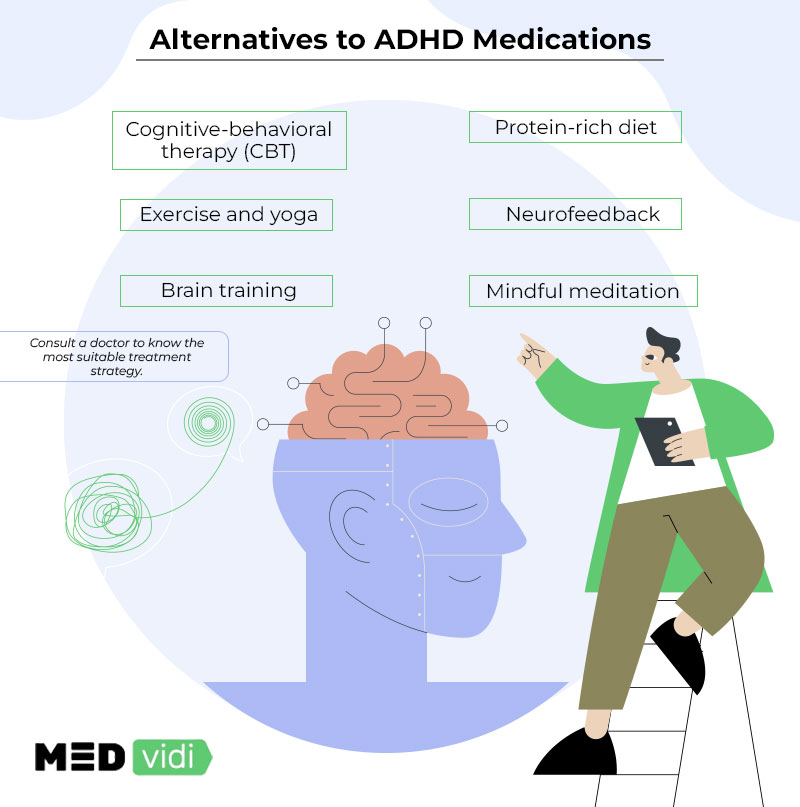The Advantages of Individualized ADHD Treatment Strategies for Better Outcomes
The implementation of individualized ADHD treatment strategies has arised as a pivotal method in enhancing healing outcomes for individuals affected by this problem (ADHD treatment). By acknowledging the special manifestations of ADHD in each person, these tailored treatments promote greater involvement and inspiration, eventually leading to much more reliable coping approaches.
Recognizing ADHD Variability
Although Attention-Deficit/Hyperactivity Condition (ADHD) is typically perceived as a single condition, its manifestations can vary significantly amongst individuals. This irregularity is influenced by a variety of aspects, including age, sex, existing together problems, and ecological contexts. Kids with ADHD might display hyper behaviors, while grownups may mostly struggle with interest deficits. Gender distinctions likewise play a function, as males are a lot more regularly identified with ADHD and often present more obvious signs and symptoms, whereas females might offer with less evident inattentiveness.
Additionally, people with ADHD might experience a range of emotional and behavioral challenges, such as anxiety or oppositional defiance, that can make complex medical diagnosis and therapy. The communication of these factors can lead to diverse experiences of ADHD, necessitating a nuanced understanding of the disorder. It is also worth noting that ADHD can provide in a different way throughout numerous social contexts, affecting just how signs and symptoms are identified and addressed. This understanding underscores the significance of recognizing ADHD as a multifaceted condition, which calls for personalized approaches to treatment that think about the unique needs and experiences of each person.
Trick Parts of Personalization
Personalized ADHD therapy strategies are grounded in several vital elements that guarantee effective monitoring of the condition. A thorough analysis is vital, including standardized ranking ranges, interviews, and behavioral monitorings. This comprehensive assessment allows medical professionals to understand the individual's special symptoms, toughness, and obstacles.
Second, the involvement of numerous stakeholders, including parents, instructors, and the individual, adds to an alternative view of the individual's needs. Partnership fosters a helpful environment that can adjust to the individual's context and way of living.
Third, treatment strategies should be adaptable and adaptable, permitting for adjustments based on continuous responses and the individual's progressing needs. This versatility makes it possible for the integration of different healing methods, such as behavior interventions, psychoeducation, and drug administration.
In addition, social and contextual elements should be considered. Acknowledging the individual's background, values, and choices makes certain that the treatment is appropriate and considerate.
Last but not least, routine follow-ups and analyses are important to check development and make necessary adjustments. By focusing on these crucial elements, individualized ADHD therapy strategies can substantially improve the efficiency of interventions, causing enhanced results for people with ADHD.
Improved Interaction and Motivation
To efficiently promote enhanced engagement and motivation in people with ADHD, it is essential to incorporate foundation psychiatry approaches that reverberate with their passions and toughness. Customized treatment plans that align with a person's interests can cause boosted involvement in therapeutic activities, cultivating a feeling of ownership and enthusiasm for the process.
Making use of interactive and imaginative adult depression techniques can likewise considerably enhance motivation. For instance, including gamification aspects or real-world applications of skills can make jobs a lot more attractive and appropriate. This not only records interest but additionally enhances discovering via delightful experiences.
Furthermore, setting possible and meaningful objectives tailored to the person can reinforce motivation. When people see their development in the direction of personally significant purposes, they are more probable to stay involved. Regular comments and acknowledgment of achievements can better suffer inspiration, producing a favorable feedback loop that urges continued initiative.
Finally, cultivating a supportive atmosphere where people feel comprehended and valued can significantly affect their involvement levels. When therapy strategies are developed collaboratively, integrating input from the person, they are much more most likely to feel purchased their trip, ultimately causing enhanced end results in managing ADHD.
Improved Coping Approaches
Establishing boosted coping methods is essential for people with ADHD, as it outfits them with efficient devices to navigate everyday challenges. A customized treatment strategy allows for the recognition of details coping mechanisms tailored to the individual's special demands and scenarios - ADHD treatment. Strategies such as mindfulness, time management abilities, and business methods can be integrated right into day-to-day routines, cultivating a feeling of control and reducing anxiety
Mindfulness practices, including meditation and deep-breathing exercises, aid people with ADHD concentrate their focus and manage their feelings. Time management techniques, such as using timers or breaking jobs right into smaller sized, workable steps, can find out here reduce feelings of overwhelm. In addition, business devices like coordinators and checklists can enhance performance and liability.
Long-lasting Positive Outcomes
Implementing personalized ADHD therapy strategies can cause significant long-term favorable results for individuals. These customized strategies, which think about distinct symptoms, choices, and life scenarios, help with more reliable administration of ADHD symptoms with time. By concentrating on the specific demands of the person, these plans enhance adherence to therapy procedures and foster greater engagement in healing activities.

Furthermore, personalized treatment strategies can dramatically lower the danger of comorbid conditions, such as anxiety and clinical depression, which are often associated with ADHD. Early treatment and constant support aid individuals build durability and coping techniques, promoting total mental health.
Eventually, the lasting positive end results of individualized ADHD therapy prepares not just improve the top quality of life for individuals yet also add to their overall wellness and success in various life domain names. This holistic technique underscores the significance of customized care in managing ADHD effectively.
Conclusion
